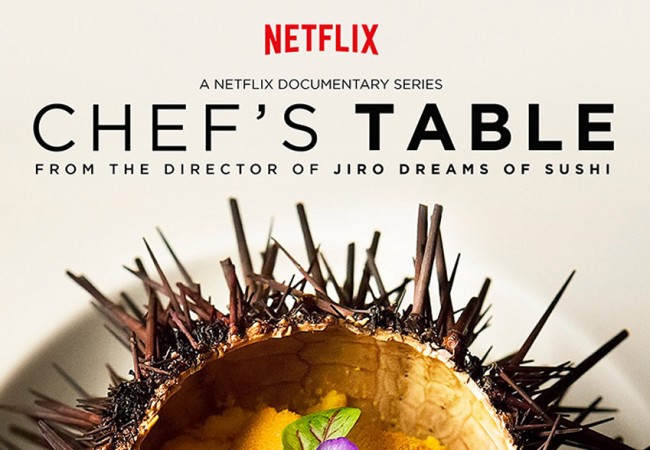Here’s a blurb from Netflix: Chef’s Table goes inside the lives and kitchens of six of the world’s most renowned international chefs. Each episode focuses on a single chef, featuring Ben Shewry (Attica Restaurant in Melbourne, Australia), Magnus Nilsson (Fäviken in Järpen Sweden), Francis Mallmann (El Restaurante Patagonia Sur in Buenos Aires, Argentina), Niki Nakayama (N/Naka Restaurant in Los Angeles, CA, USA), Dan Barber (Blue Hill Restaurant at Stone Barns and in New York City, USA) and Massimo Bottura (Osteria Francescana in Modena, Italy) and their unique look at their lives, talents and passion from their piece of culinary heaven.
I was reading Massimo Bottura’s recipe book, Never Trust a Skinny Italian Chef, and googled him for more info when I chanced upon this amazing, artful series of documentaries: 6 episodes, 6 chefs. Before this, I had only heard of Bottura and Magnus Nilsson. But I watched the other four episodes anyway.
This is how the format of every episode goes: a short clip of the chef’s philosophy. Opening credits. Food writers, who probably met the chef once or twice in their lives, exalt the chef but they are just making empty encomium like “He really cooks with his heart” or “you have never eaten sashimi like hers before” or “He redefines the culinary scene.” Then the documentary truly begins. Traces the origins, motivations, and drive behind the creativity of the chef. Highlights the nadir in chef’s life and how s/he overcomes it. Then ends with poignant note.
It may sound formulaic but the direction is stylish and the series reveals much about the culinary world. The chefs have skills indubitably, but so many other chefs have skills; their success is mostly pure luck and ambition. Like Ben Shewry (above). I get the impression that he isn’t a very good chef, but he got lucky somehow. Or Massimo Bottura. An influential Italian food critic stumbled upon his restaurant and boom! he was made. The message that the series gives us is both positive and delusional: if we work hard and persevere, we will make it. And if we don’ succeed, it doesn’t mean we are unskillful; it just means we are unlucky.
The series is also ideological through the chef Niki Nakayama in a number of ways. (She’s my favorite episode, after Massimo.) She’s presented as an outsider who made good:
(a) Female in a traditional Japanese family, always second place to her elder brother.
(b) Female sushi chef. Sushi chefs are all men because Japanese believe that women’s hands are warmer, which will spoil the seafood, and because menstruating women will spoil the seafood too.
(c) Japanese-American in USA.
(d) Lesbian.
Her struggles are real, of course, but she’s the perfect token minority chef to be featured. I don’t know if being a token minority is a good or bad thing, but at least the producers thought of the diversity.
 The only thing that I dislike about the series is how they portray chefs to be so perfect. What are their foibles? Do they have any dark side? Even when Dan Barber hurls vulgarities at his cooks, the documentary shows him being contrite, and hence endearing. The perfection of the chefs irks me because the portrayals are unreal and unrealistic. This is a documentary, but risks being a hagiography.
The only thing that I dislike about the series is how they portray chefs to be so perfect. What are their foibles? Do they have any dark side? Even when Dan Barber hurls vulgarities at his cooks, the documentary shows him being contrite, and hence endearing. The perfection of the chefs irks me because the portrayals are unreal and unrealistic. This is a documentary, but risks being a hagiography.
The pace may be a little slow at times, but I watch a lot of art films, so I am patient. I can’t wait for season 2 and I’m nominating Jacques Pepin to be featured. I’ve been watching his videos, and he’s absolutely charming.
Written by A. Nathanael Ho.
Categories: Entertainment Review
